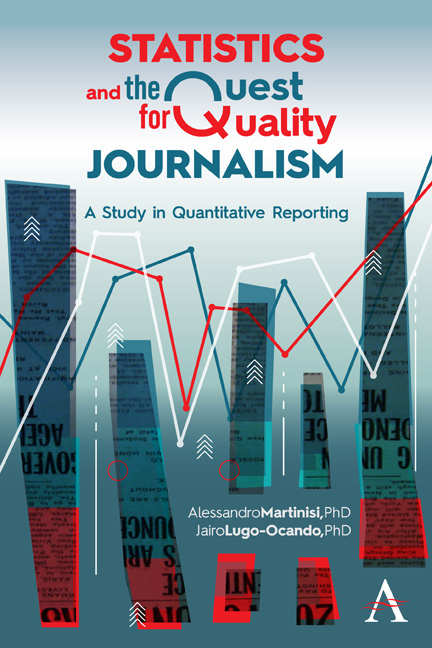Book contents
- Frontmatter
- Dedication
- Contents
- List of Illustrations
- 1 Introduction
- 2 Numbers as Information in the Information Society
- 3 The Never-Ending Debate on Quality in Journalism
- 4 Statistics in Journalism Practice and Principle
- 5 The Normative Importance of ‘Quality’ in Journalism
- 6 Journalism Meets Statistics in Real Life
- 7 The Ideology of Statistics in the News
- Epilogue
- References
- Index
Epilogue
Published online by Cambridge University Press: 07 November 2020
- Frontmatter
- Dedication
- Contents
- List of Illustrations
- 1 Introduction
- 2 Numbers as Information in the Information Society
- 3 The Never-Ending Debate on Quality in Journalism
- 4 Statistics in Journalism Practice and Principle
- 5 The Normative Importance of ‘Quality’ in Journalism
- 6 Journalism Meets Statistics in Real Life
- 7 The Ideology of Statistics in the News
- Epilogue
- References
- Index
Summary
While wrapping up this book, we witness the global crisis set in motion by the spread of the COVID-19 virus. According to the latest figures released in May 2020 by the European Centre for Disease Prevention and Control, there were almost 300,000 deaths worldwide at that time, and the consequences on the worldwide economy seemed probably huge and long lasting, although by then still unknown in detail. What was certain then and now was that many lives were shattered and whole communities disseminated by this crisis. Indeed, by the time it was officially declared a pandemic by the World Health Organization (WHO), it was already a full-scale destructive force that resembled – at least in the eyes of those in places such as Guayaquil, Ecuador, and in Bergamo, Italy – one of the Horsemen of the Apocalypse.
In response to these events, governments and political leaders engaged at different speeds in the implementation of emergency strategies that involved all sectors of their societies. The state of emergency forced them to undertake action, although only for some of these leaders the action and sense of urgency were in fact ‘immediate’. This is because while some prioritized the health and lives of people, others instead believed that saving the economy was far more important. As these debates took place among elites, doctors, nurses, first responders and, overall, ordinary people such as postal workers, cleaners and rubbish collectors kept society afloat. The sheer number of ordinary people who suddenly became heroes but who until those days were often invisible to the public eye reminded us that society is not made by the few but by the many.
As the number of deaths climbed, fingers started to be pointed at culpables even before any peak was reached, perhaps looking to displace responsibilities. Some leaders spoke every day while others remained silent. During that leadership vacuum, fake news and the misrepresentation of numbers spread globally as fast as the pandemic did. The battle for the hearts and minds of the public soon became an information war or ‘Infodemic’, as described by the director-general of the WHO, Tedros Adhanom Ghebreyesus.
- Type
- Chapter
- Information
- Statistics and the Quest for Quality JournalismA Study in Quantitative Reporting, pp. 171 - 174Publisher: Anthem PressPrint publication year: 2020



